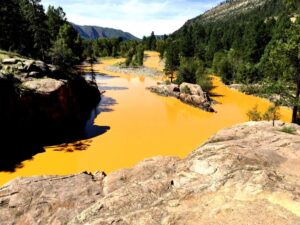Mercury: An Elemental Problem
Ayaan Raza
02 December 2023
No Comments
You probably have heard that you shouldn’t have too much fish in one week–just one or two servings is the recommended amount–because of the increased concentration of pollutants in the ocean. But one in specific is wreaking havoc in our seas: mercury. The sixtieth element on the periodic table, mercury exists in nature in its elemental form as a silvery metallic liquid and in its various ores. Unlike many other pollutants that affect our waterways, mercury is a virtually indestructible pollutant for this very reason: it cannot be broken down any further. Once it enters the ocean, it stays there almost indefinitely, poisoning fish and other wildlife if it builds up in high enough concentrations.

Mine waste from the Gold King Mine north of Silverton seeps into the Animas River at Bakers Bridge and contaminates it.
Living by the coast my entire life, I have observed the instrumental part fishing has played in our local economy. Our friends and family consume a large amount of fish, making it frightening to learn the impact of pollution on fish populations and our health as consumers. Mercury has been repeatedly found in contaminated fish, and as a result, often ends up in the digestive systems of people who eat them. Mercury is extremely toxic to humans and leads to damaging effects such as both kidney and brain damage that inhibit our bodily growth and development. As a neurotoxin, it also has the ability to cause severe damage to the human nervous system if consumed in large enough amounts.
Mercury is often produced as a result of the industrial scale mining of various ores, especially cinnabar, or mercury sulfide. However, the biggest single source is the burning of fossil fuels, especially in coal-fired power plants, which releases 160 tons of mercury a year into the air in the United States alone. From there, rainfall washes the mercury into the ocean. Another slightly less prominent yet noticeable input of mercury into the environment is the discharge mercury-laden industrial effluents directly into rivers or the ocean.

Coal-fired power plants are major emitters of mercury into the environment.
We know that the majority of pollution that is affecting our oceans today is caused either directly or indirectly by humans. Thus, we need to hold ourselves accountable and accept that it is our responsibility to clean up the damage we cause—the problem won’t fix itself.
Copyright © 2019 - 2024 CAWaterConservancy.org.

Leave a Reply